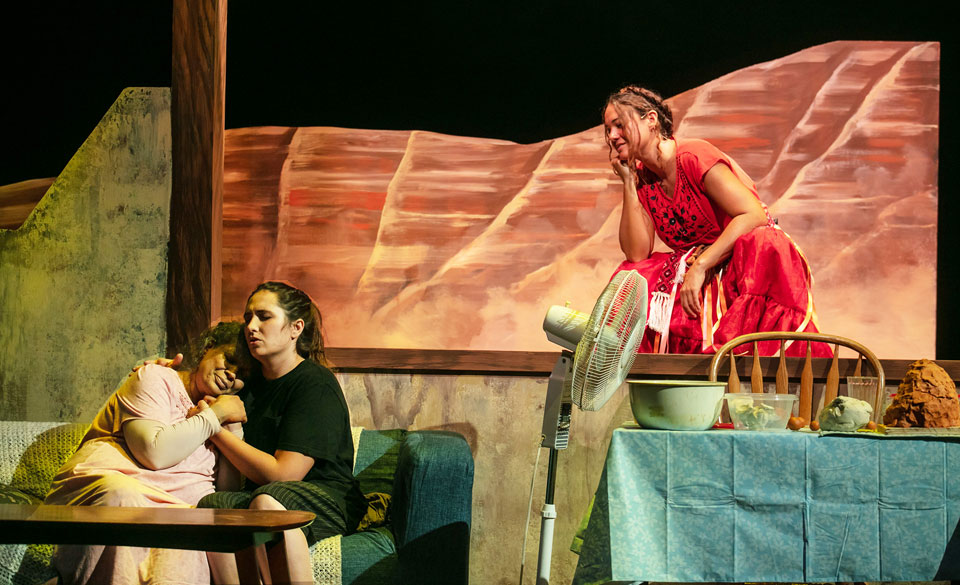
LOS ANGELES — A soulful new play by Lily Rushing explores an aspect of American Southwest history that most Americans, including many descendants of Native peoples, probably don’t know. Familiar by now is the understanding that the Spanish Catholic missions kept the Indigenous populations they converted in forced confinement and labor, but did actual slavery exist? Yes, it did, according to recent research and family memory that has come to light.
And if you pick up historian Gerald Horne’s book The Counter-Revolution of 1836: Texas Slavery & Jim Crow and the Roots of U. S. Fascism, you’ll find that certain Indigenous nations kept slaves themselves, often people from other nations that they conquered as war booty. Horne argues that this custom was one of the fatal weaknesses that kept African Americans and Native Americans opposed to one another at a time when they needed unity against the white slaveowning class.
The Latino Theater Company partners with Native Voices at the Autry, two important companies People’s World takes great pleasure in reviewing. In the past Native Voices actually did stage its plays at the Autry Museum of the American West, located in L.A.’s Griffith Park. It’s notable that the only Actors’ Equity theater company in the country dedicated to developing and producing new plays by Native artists has joined forces with one of the great Latino companies in the United States.
“We are thrilled to be collaborating on our first co-production, as this partnership exemplifies community and is a powerful example of the way American theater could and should be,” said Latino Theater Company artistic director José Luis Valenzuela and Native Voices artistic director DeLanna Studi in a joint statement.
Lily Rushing has given us a haunting, poetic rumination on identity, family, colonialism, slavery and internal migration over many generations, featuring the women as the bearers not only of children but of stories and dreamlike visitations. Sylvia Cervantes Blush directs the world premiere of Desert Stories for Lost Girls, playing through October 16.
When 18-year-old Carrie moves in with her cognitively-challenged grandmother Rosa, she is thrown into a world of memory and mystery that unearths her family’s Genízaro identity, shining a spotlight on a dark, oppressive period in our collective history.
Beginning in the early 1600s, Spanish colonists sought to “reeducate” (and “detribalize”) the Native people of the Southwest. Funded by the Spanish Crown, the Spanish first abducted and then later purchased captives from surrounding tribes, including Apache, Comanche, Kiowa, Navajo, Pawnee and Ute. The colonists removed these individuals to their households, where they were taught Spanish and converted to Catholicism. They were forced to work as household servants, tend fields, herd livestock, and serve as frontier militia to protect Spanish settlements. Many endured physical abuse, including sexual assault. The Spanish called these captives and their children “Genízaro.” Today, Genízaros, not as a tribe per se but as a historical and social identity, comprise as much as one-third of the population of New Mexico and southern Colorado.
“I was in college when my mother found an old census and I took a deep dive into researching my Genízaro identity,” says Rushing, who hails from Sacramento and began developing the play as an undergraduate at DePaul University, where she received her B.F.A in playwriting. “The characters in the play are all based on my ancestors. Plácida, my great-great grandmother, was sold into slavery as a child; she had my great grandfather when she was only 11 or 13 years old. My grandparents, Rosa and Joe, moved to California to escape sharecropping. But the other half of my family is still in New Mexico.”
Throughout the play, characters from the past appear in corporeal form, and each time, as the stories unfold, Carrie draws closer to understanding the truth of her heritage. “Somewhere we lost them. We forgot to remember. But she and she and she, they’re with me now, so.” These ancestors will continue to walk with her as she gets on with the rest of her life.

“What excites me about Desert Stories is that it touches on very dark subject matter in a poetic way that lends itself for highly theatrical staging,” says director Blush. “It challenges us to let go of our expectation for a safe narrative. It invites us to lean into the words and visual storytelling to have an experience.”
Native Voices not only tells Native stories but employs Native actors. The cast of Desert Stories for Lost Girls includes Katie Anvil Rich (Cherokee, Chickasaw) as Carrie; Carolyn Dunn (Cherokee, Mvskoke Creek, French Creole and Tunica/Choctaw Biloxi descent) as Rosa; Samantha Bowling (Cherokee) as Plácida; Rainbow Dickerson (Rappahannock, Thai, European descent) as Rosita, Rosa’s younger self; Glenn Stanton (Cherokee), doubling as Rosita’s husband Joe, and Spanish landowner Nicholas Jacinto; Brenda Banda as Josefa Jacinto, Nicholas’s barren wife; and Tom Allard (Loyal Shawnee) as Carrie’s Uncle Edgar.
The creative team includes scenic and props designer Christopher Scott Murillo; lighting and projection design team Derek Christiansen and Ruby O’Brien; sound designer Mia Glenn-Schuster; costume designer Lorna Bowen (Muscogee Creek, Seminole, Cherokee); and dramaturg Courtney Elkin Mohler (Santa Barbara Chumash).
The play runs 105 minutes without intermission. The stage set itself is almost a character in the play, with its far-off buttes, tumbleweeds, trees, and the dry earth and dust that seem to pervade even the interior of Rosa’s house. Weed-smoking Uncle Edgar, who has until now been caring for his senile mom, warns Carrie not to go outside: There are snakes in the back yard, homeless people in the front yard, and strange faces that suddenly loom up in the windows.
Among the strongest scenes in the play are those featuring the younger Rosa and her husband Joe Black, who are burdened with inherited debt from her father on the land the family has occupied as sharecroppers for generations. Rosa has been culturally conditioned to honor that intergenerational debt, and is even complacent with passing it along to the next generation. Also, she feels bound not to desert the bones and spirits of her ancestors, who will feel abandoned if she decamps to California. She “belongs” to this sorry, exploitative patch of land, even as she does not own it. Tradition can be uplifting and affirmative; it can also be enslaving.
Theatergoers should not expect an expository narrative with a dependable through line. Much of the writing expounds on memory, dream, revelation, intuition, spirit, feeling, and the out-of-joint proverbs of an incoherent old lady. A suitcase—that as a young woman she carried to California—symbolically stands in for the brain as a repository for all these ideations and physical objects. The script comes across as somewhat declamatory; the playwright has uncovered all the sorrow in the tale she spins, but little joy. Still, the subject matter alone will be an attraction to lots of people in Southern California with their own questions about where they come from, and the production itself is a theatrical marvel.
Desert Stories for Lost Girls plays on Thurs., Fri. and Sat. at 8 p.m. and Sun. at 4 p.m. through October 16. The Los Angeles Theatre Center is located at 514 S. Spring St., Los Angeles 90013. Parking is available for $5 with box office validation at Joe’s Parking structure, 530 S. Spring St. (immediately south of the theater). To purchase tickets and for more information, including up-to-date Covid-19 safety protocols on the day of each performance, call (213) 489-0994 or go to www.latinotheaterco.org.












Comments